We can find at least a dozen of Jesus’ parables about the kingdom of God scattered throughout the Gospels. (Most of the parables of God’s kingdom we find in Matthew.)
These parables paint a picture of God’s kingdom as something that is both like a large tree that birds can nest in, and like a party that we are invited to. We are invited into building the kingdom of God, and we are each given a choice about accepting the invitation or not.
Here is a deeper dive into Jesus’ parables about the kingdom of God and what we can learn from them.
How many parables about the kingdom of God are there?
There are 12 parables about the kingdom of God that Jesus tells in the Bible. We find these parables in Matthew, Mark, and Luke’s Gospels.
- the parable of the hidden treasure
- the parable of the pearl of great price
- the parable of the net
- the parable of the household treasures
- the parable of the mustard seed
- the parable of the yeast
- the parable of the growing seed
- the parable of the great banquet
- the parable of the ten virgins
- the parable of the talents
- the parable of the unmerciful servant
- the parable of the workers in the vineyard
The Sheep and the Goats
Jesus doesn’t only describe the kingdom of God in parables. In Matthew 25:31-46, Jesus talks about the kingdom of God in terms of “the sheep and the goats.” When the Son of Man comes into his glory, Jesus tells us, all people will be gathered before him and he will separate them like a shepherd separates the sheep from the goats. He will put the sheep on his right and the goats on his left.
Then he will say to the sheep on his right, “Come, you who are blessed by my Father; take your inheritance, the kingdom prepared for you since the creation of the world. For I was hungry and you gave me something to eat, I was thirsty and you gave me something to drink, I was a stranger and you invited me in, I needed clothes and you clothed me, I was sick and you looked after me, I was in prison and you came to visit me.”
To the goats on his left he will say, “Depart from me, you who are cursed, into the eternal fire prepared for the devil and his angels. For I was hungry and you gave me nothing to eat, I was thirsty and you gave me nothing to drink, I was a stranger and you did not invite me in, I needed clothes and you did not clothe me, I was sick and in prison and you did not look after me.”
Jesus explains that he does not mean that those who inherit the kingdom of God literally saw him hungry, or thirsty, or a stranger, but that, “whatever you did for one of the least of these brothers and sisters of mine, you did for me”.
What we learn from this passage is that those who inherit the kingdom of God are those who help others, those who look after not just themselves and their loved ones, but also the most vulnerable and needy.
Why did Jesus use parables to teach about the kingdom of God?
In Matthew 13, the disciples ask Jesus why he uses parables to teach about the kingdom of God. Jesus answers that speaking in parables results in some people understanding and gaining “the knowledge of the secrets of the kingdom of heaven” (Matthew 13:11) and some people hearing but failing to understand. This fulfills the prophecy of Isaiah that says,
“You will be ever hearing but never understanding;
you will be ever seeing but never perceiving.
For this people’s heart has become calloused;
they hardly hear with their ears,
and they have closed their eyes.
Otherwise they might see with their eyes,
hear with their ears,
understand with their hearts
and turn, and I would heal them.” (Isaiah 6:9,10)
The short answer to the question why did Jesus use parables to teach about the kingdom of God is that it fulfills prophecy about Jesus himself.
We could also make some educated guesses about a longer answer. Jesus says to his disciples, “blessed are your eyes because they see, and your ears because they hear. For truly I tell you, many prophets and righteous people longed to see what you see but did not see it, and to hear what you hear but did not hear it” (Matthew 13:16-17). He then follows this statement with an explanation of the parable of the sower.
So the parable of the sower (the parable of the growing seed) tells us why some people understand Jesus’ parables and some people don’t, and also perhaps why Jesus teaches in parables.
To understand the parables, one must be “good soil”. It is only in the good soil and the seed of the kingdom of God falls and takes root. We might think of the rocky ground as someone who hears the parables but doesn’t understand, or doesn’t remember or put the lessons into action. The seed falling among thorns is like the person who hears the parables and the teachings of Jesus and maybe even understands them, but then gets distracted by the cares of the world and the seed of the kingdom gets choked out.
It is only in the good soil where the seed of the kingdom of God takes roots and flourishes. These are the people who hear and understand Jesus’ teachings and put them into action; they take root. This person bears fruit.
We might say that Jesus teaches in parables in order to test our “soil”. Are we listening? Are we paying attention? Are we keeping our focus on Jesus and the kingdom of God and not our own kingdoms that we might be tempted to build?
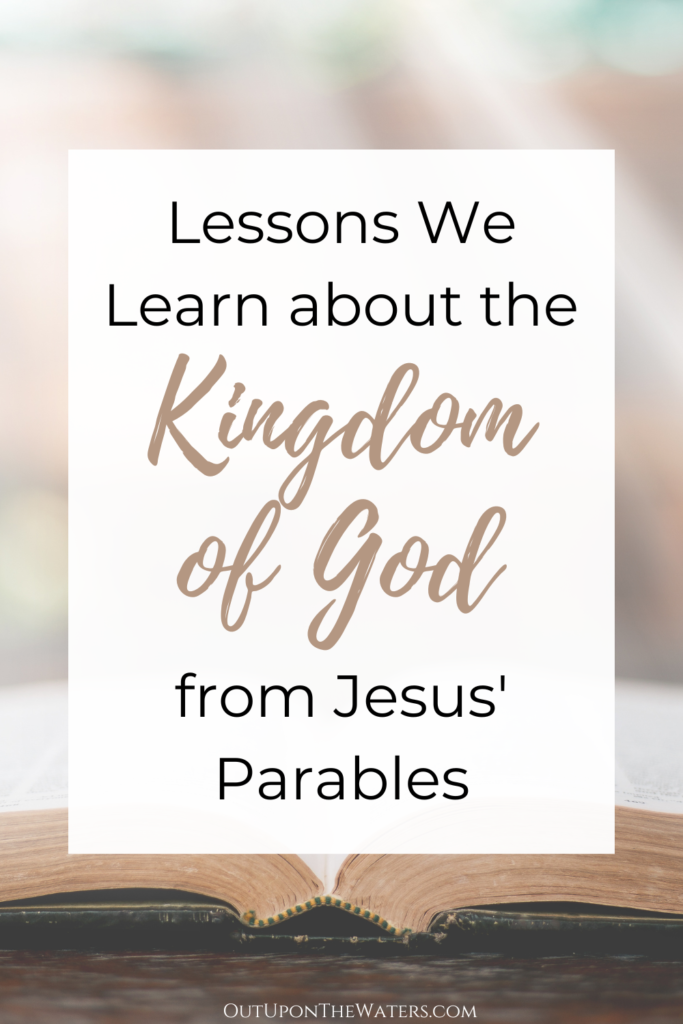
19 Important Things that We Learn from the Parables of the Kingdom of God
From Jesus’ parables about the kingdom of God, we learn that the kingdom of God is much more valuable than anything that we could own here on earth. We learn that we are invited to participate in bringing about this kingdom, that we are to invite others in, try new things, take risks… We learn that everyone is welcome in God’s kingdom, but that some will refuse the invitation, and that we can miss the invitation if we are too busy and distracted, or concerned with other things. God’s kingdom involves relationships, provision, and the restoration of all things.
Here are 19 lessons that we can learn from Jesus’ parables about the kingdom of God.
- The kingdom of God is much more valuable than anything that we own here on earth (the parable of the hidden treasure).
- God gave up everything that he had in order to rescue and redeem us, to bring us into his kingdom (the parable of the pearl of great price).
- Everyone is welcome, but some will choose to turn away or reject God’s invitation (the parable of the net).
- The elements of God’s kingdom are both new and old (the parable of the household treasures).
- God wants us to try new things (the parable of the household treasures).
- The kingdom of God starts small, but it grows into the largest of garden plants. It is a place where we are welcomed in and a place we can call home (the parable of the mustard seed).
- Great things can come from small beginnings (the parable of the mustard seed).
- God’s kingdom changes us, and changes the world around us (the parable of the yeast).
- God will cause the growth. We need to show up, show the love of God to the world, and leave the results to God (the parable of the growing seed).
- The kingdom of God is like a party (the parable of the great banquet).
- The kingdom of God stretches us, and compels us to love even those who we are not naturally inclined to love (the parable of the great banquet).
- When we place other things above God, even things that seem good, we lose out on the kingdom (the parable of the great banquet).
- We can be left out of the kingdom because we were too busy doing other things (the parable of the ten virgins).
- God entrusts his wealth to us (the parable of the five talents).
- God wants us to invest in his kingdom (the parable of the five talents).
- God wants us to take risks (the parable of the five talents).
- God has forgiven all of our debts and wrongdoing and that we can only inherit the kingdom of God if we similarly forgive others (the parable of the unmerciful servant).
- All are welcome in the kingdom of God, and all receive the same reward, regardless of when they “join” (the parable of the workers in the vineyard).
- God is generous, and that we do not earn the kingdom of heaven; it is a free gift given to us (the parable of the workers in the vineyard).
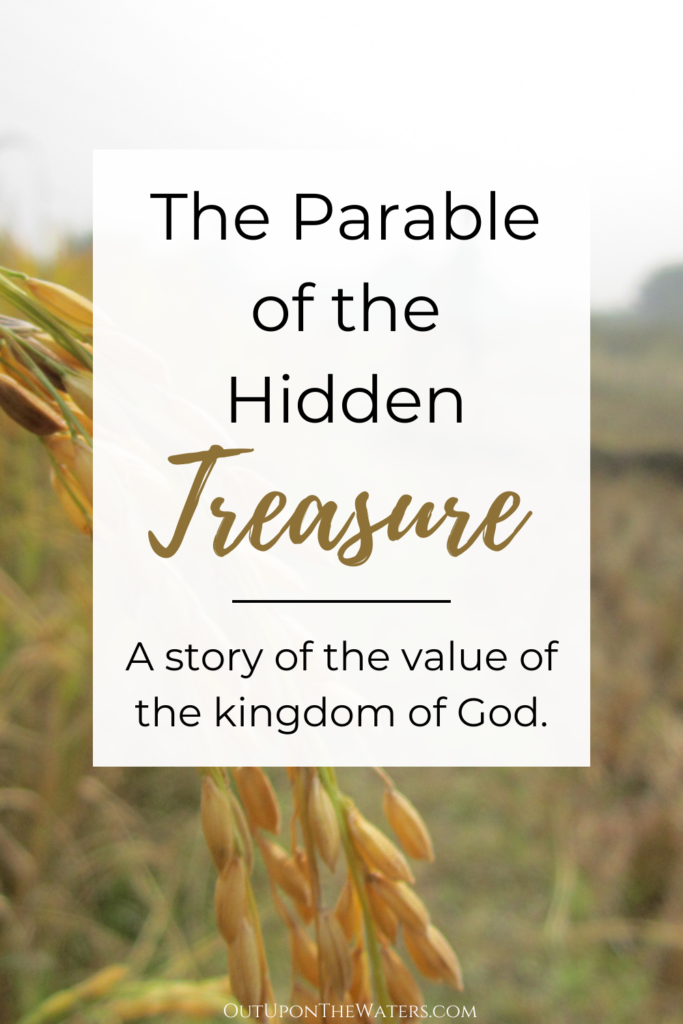
The Parable of the Hidden Treasure
In Matthew 13:44, Jesus says, “The kingdom of heaven is like treasure hidden in a field. When a man found it, he hid it again, and then in his joy went and sold all he had and bought that field.”
This tells us that the kingdom of heaven (the kingdom of God) is much more valuable than anything that we own here on earth.

The Parable of the Pearl of Great Price
In Matthew 13:45-46, Jesus says “Again, the kingdom of heaven is like a merchant looking for fine pearls. When he found one of great value, he went away and sold everything he had and bought it.”
Typically, this parable is taken to mean that the kingdom of heaven (the kingdom of God) is like a pearl of great price, more valuable than anything that we own here on earth and something worth searching for.
However, this parable actually says that the kingdom of heaven is like a merchant looking for fine pearls.
This was a lesson that I learned when exploring this story in children’s ministry. What if the kingdom of heaven is like the merchant and we are the fine pearls? What if it is God who sold everything that he had (figuratively speaking) in order to rescue us?
Reading the parable of the pearl of great price in this way fits with the notion that Jesus gave up his life (everything that he has, so to speak) in order to “buy” us, to rescue us from sin and death.
(See Isaiah 43, The Message translation, for this same idea that God sold everything he had in order to rescue and redeem us.)

The Parable of the Net
In Matthew 13:47-50, Jesus says that the kingdom of heaven (the kingdom of God) is like a net that was let down into the lake and caught all kinds of fish. “When it was full, the fishermen pulled it up on the shore. Then they sat down and collected the good fish in baskets, but threw the bad away. This is how it will be at the end of the age. The angels will come and separate the wicked from the righteous and throw them into the blazing furnace, where there will be weeping and gnashing of teeth.”
This parable tells us a few things about the kingdom of God. First, the kingdom of God is good news meant for all people. The net catches all kinds of fish.
But not all the fish are kept. The fishermen collect the good fish and throw the bad away. This is a common theme in Jesus’ parables that focus on the element of the day of judgement. Not everyone gets into the kingdom of heaven. Everyone might be welcome, but some will choose to turn away or reject God’s invitation.
Throughout the Bible, we learn that what matters is our character and how we treat others. God looks at our hearts. (See, for example, the story of David when he is chosen king: God choses him because of his “heart”.)
The image of the blazing furnace is an interesting one. It could signify a purifying fire, rather than a punitive one. And if it is a purifying fire, then it would, quite likely, burn away all the selfish, self-centered, and self-interested parts of us. The question we each need to ask, in that case, is what would be left after this purification process?
(C.S. Lewis gives us a compelling picture of this process in The Great Divorce where he suggests that for some, their whole selves are burned up in the purifying fire. Being cast out of the kingdom of heaven, in that case, is not a punishment but rather the natural consequence of having the “natural” self burned away.)
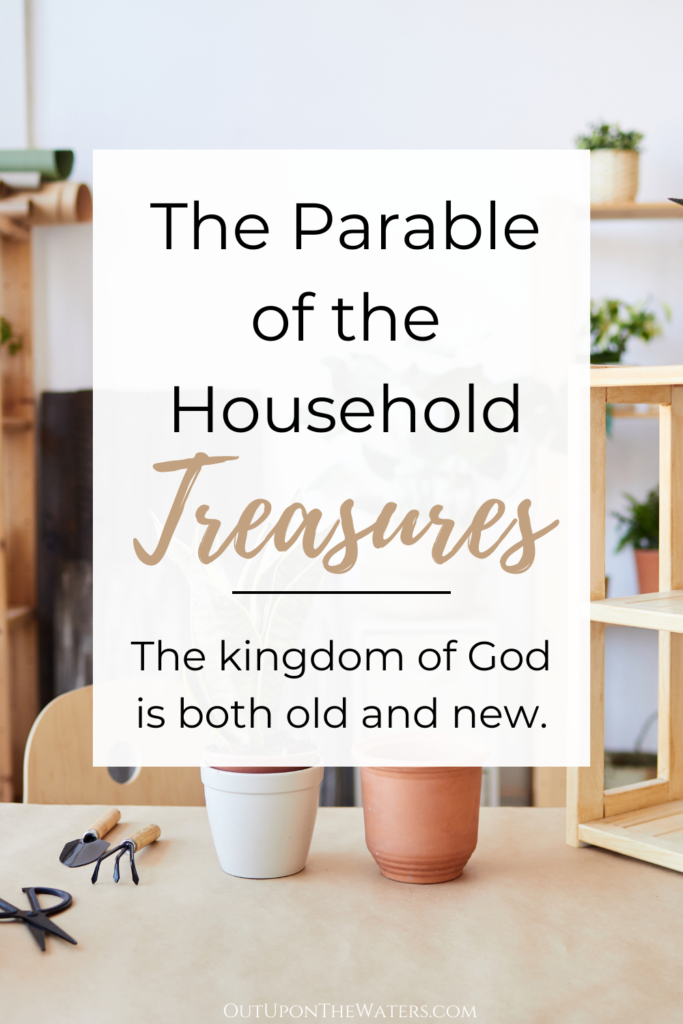
The Parable of the Household Treasures
In Matthew 13:52, Jesus says that “every teacher of the law who has become a disciple in the kingdom of heaven is like the owner of a house who brings out of his storeroom new treasures as well as old.”
This parable tells us that the elements of God’s kingdom are both new and old.
There are many “old” treasures that we need to hold onto but there are also many “new” treasures. In Isaiah 43:19, God says, “Behold, I am doing a new thing.” This points forward to Jesus and the “new covenant”, but it also suggests that God is in the business of doing new things. In Revelation 21:5, he says, “Behold, I am making all things new.”
The old things will ground us: Bible stories, the Creeds, the doctrines that the church fathers wrestled with for decades (think the doctrine of the Trinity and the full humanity and full divinity of Christ). But how we encounter God may be new, our experience and our expression of our faith may change with our life stages, and each culture and each generation must make their faith their own. We are constantly in a process of renewal, of making things new until God promises to fix all things and make all things new.
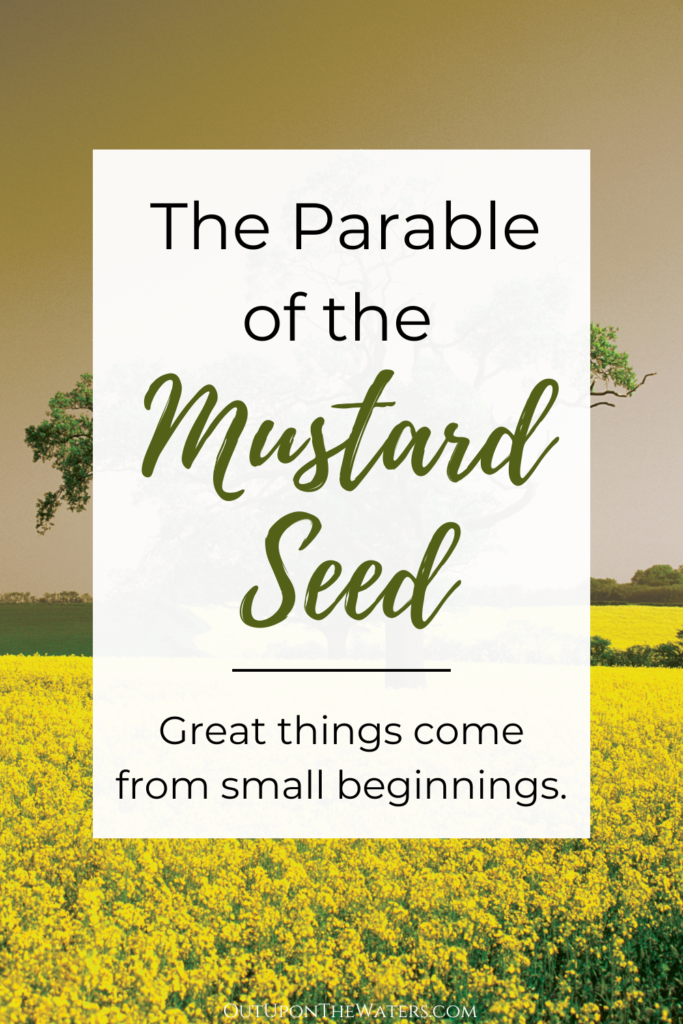
The Parable of the Mustard Seed
In Matthew 13:31-32, Jesus says that “the kingdom of heaven is like a mustard seed, which a man took and planted in his field. Though it is the smallest of all seeds, yet when it grows, it is the largest of garden plants and becomes a tree, so that the birds come and perch in its branches.”
This parable tells us that God’s kingdom starts out small, but that it grows into something many times the size of the seed that it came from. It becomes like the largest of the garden plants and it sustains and supports life. The birds can come and perch in this tree and make it there home. So, too, we can make the kingdom of heaven (the kingdom of God) our home.
Great things can come from small beginnings.
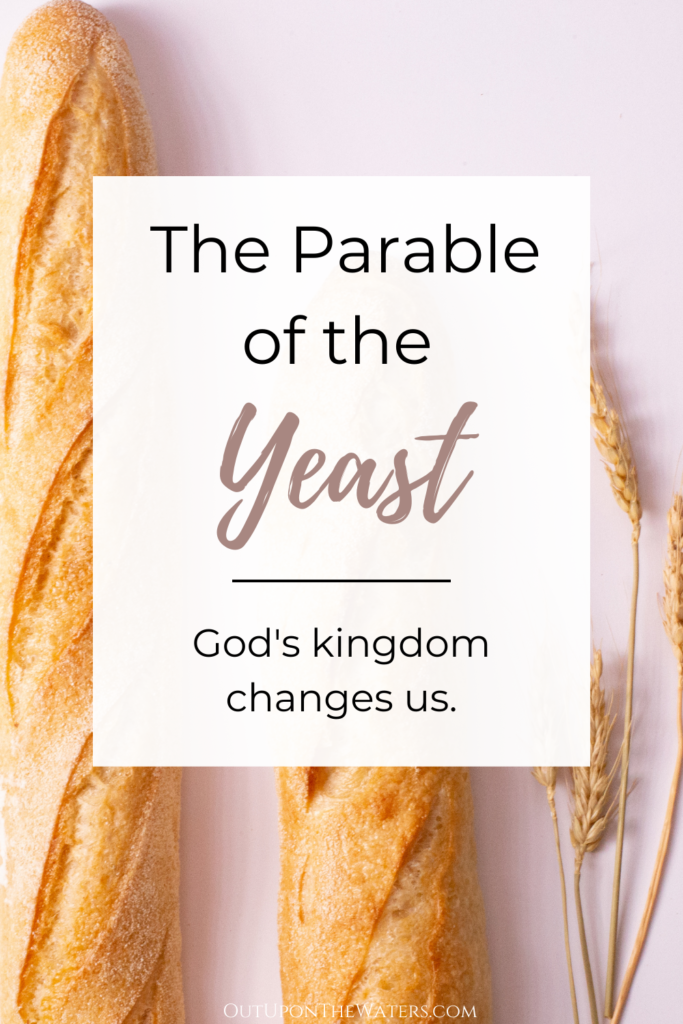
The Parable of the Yeast
In Matthew 13:33, Jesus uses another parable that involves growth. There, he says that “the kingdom of heaven is like yeast that a woman took and mixed into about sixty pounds of flour until it worked all through the dough”.
Yeast not only grows, it changes the whole environment around it. Just like the yeast spreads through the dough, so too the kingdom of God is wide: it spreads across the whole earth. And it changes the world around it.
We can see here a hint that the God’s kingdom isn’t just about “heaven” located in some other place and some other time. It is also about the world, here and now. We can get glimpses of God’s kingdom here and now. It is like the yeast that mixes through the whole earth and changes it, making it just a little bit more like what God intended. It is also like the yeast that mixes through out own characters, making each of us more like the heavenly creatures that we were created to be.
God’s kingdom changes us, and changes the world around us.
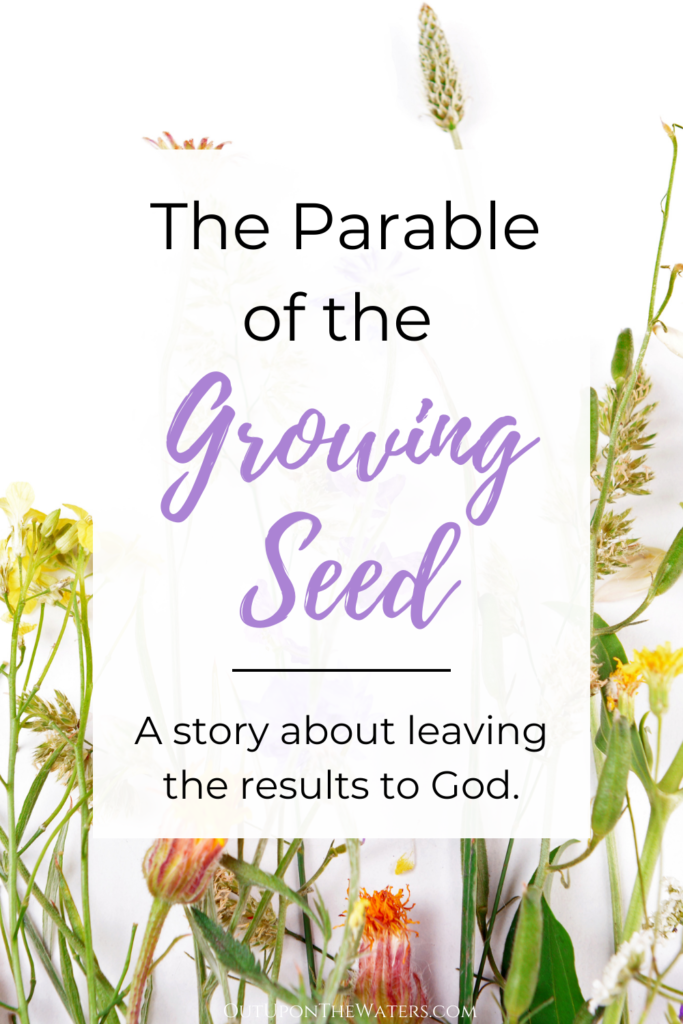
The Parable of the Growing Seed
We find the parable of the growing seed in Mark 4:26-29. There, Jesus tells us that “this is what the kingdom of God is like. A man scatters seed on the ground. Night and day, whether he sleeps or gets up, the seed sprouts and grows, though he does not know how. All by itself the soil produces grain—first the stalk, then the head, then the full kernel in the head. As soon as the grain is ripe, he puts the sickle to it, because the harvest has come.”
In this parable, we are the ones who scatter seed, but it is God who helps it to grow. What this parable teaches us is that we are to share the good news of the Gospel, to be the light of Christ in the world, to love our neighbors, and in this way we are “planting seeds”. But we are not in charge of making the seeds grow. We do not determine which seeds grow and which do not. We need to show up, show the love of God to the world, and leave the results to God.
When we can relinquish our need to control the outcome and focus just on planting seeds, then we are trusting God to be God and focusing on our part in bringing about the kingdom.

The Parable of the Great Banquet
We find the Parable of the Great Banquet in Luke 14:15-24. Jesus compares the kingdom of God to a great banquet. The host of the banquet had invited many guests, and he instructed his servants to go and tell the guests that they could come in, for everything was now ready.
But when the servant went to the invited guests, they all made excuses, claiming that they had other, more pressing, things to do or places to be. The host of the banquet gets angry and tells his servant to go out into the streets and bring in ” the poor, the crippled, the blind and the lame” (Luke 14:21) and to invite anyone who will come so that the house will be full. The invited guests who refused to come are then unable to get even a taste of the banquet.
This parable tells us that the kingdom of God is like a party. It is social, it is fun, and everyone is invited. (This also means that the kingdom of God quite likely involves people who we might not choose to be friends with or associate with normally. The kingdom of God stretches us, and compels us to love even those who we are not naturally inclined to love.)
This parable also teaches us that we have a choice: we can accept or refuse God’s invitation. The invited guests, in this parable, refused the invitation because they placed more value on worldly responsibilities and accomplishments: tending to property, purchasing and trying out the things that one has bought, and even marriage/relationships. When we place other things above God, even things that seem good, we lose out on the kingdom.
When we place God first, however, we can bring our loved ones in and we are cared and provided for.

The Parable of the Ten Virgins
In Matthew 25:1-13, Jesus compares the kingdom of heaven (the kingdom of God) to ten virgins who took their lamps out to meet the bridegroom. Only five of them were wise enough to bring oil in jars along with their lamps, so that the lamps would not go out while they waited.
At midnight, someone cried out that the bridegroom was arriving and all ten virgins (who had been sleeping) awoke and jumped up. Those whose lamps had gone out went out to buy more oil. But the bridegroom arrived while they were out and they were shut out of the wedding banquet.
Jesus ends this parable by saying, ” keep watch, because you do not know the day or the hour.”
This parable is a warning to keep watch and be ready. The early disciples expected Jesus’ return imminently. That sense of urgency is reflected in this parable.
But even now, nearly 2,000 years after Jesus’ death, resurrection, and ascension, we can still learn from this parable though we may not experience the same sense of urgency.
We are told, here, to be prepared. We do not know the day or the hour that God will redeem all things and make all things new (whether we interpret that as the end of our own lives or as the second coming of Jesus). At some point, we will be called to account for our lives and our actions, and at that point we do not want to be busy and distracted doing other things.
We can see some parallels in this parable with Jesus’ parable of the sower (the growing seed): if we get distracted and caught up in the concerns of the world, we can choke out the kingdom of God that we are invited into, or we can “miss the party”, so to speak, we can be left out of the kingdom because we were too busy doing other things.
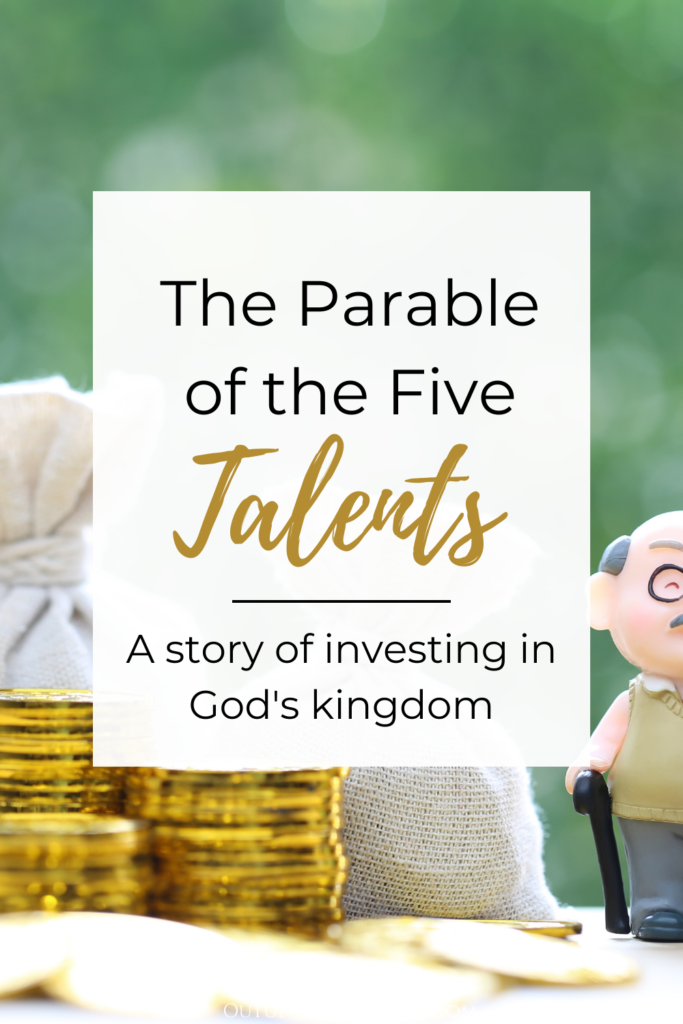
The Parable of the Five Talents
Also known as the Parable of the Three Servants, or the Parable of the Five Bags of Gold (one talents is roughly equivalent to one bag of gold), Jesus tells this parable in Matthew 25:14-30. There, he says that the kingdom of God is “like a man going on a journey, who called his servants and entrusted his wealth to them. To one he gave five bags of gold, to another two bags, and to another one bag, each according to his ability. Then he went on his journey.” (Matthew 25:14-15)
Both the servant who received two bags of gold and the one who received five bags of gold invested and doubled the money. The servant who received one bag of gold dug a hole in the ground and hid his master’s money there, wanting to keep the money safe and fearing retribution from his master if something should go wrong.
When their master returns, he praises the first two servants and invites them to “Come and share your master’s happiness.” He scolds the third servant, gives that one bag of gold to the first servant, and throws the third servant out into the darkness.
In doing this, he says “whoever has will be given more, and they will have an abundance. Whoever does not have, even what they have will be taken from them” (Matthew 25:29).
What we learn from this parable is that God entrusts his wealth to us. We are given the whole earth, after all, and instructed to tend and care for it (Genesis 1:26).
We are also entrusted with the good news of the Gospel, and told to go and make disciples of all nations. We are entrusted, in fact, with the kingdom of God. We are to become more and more like Christ, to love God and love our neighbors, and to transform the world around us.
When we take the good news of Jesus’ live, death, and resurrection, and when we put his teachings into practice, we are investing the wealth of God’s kingdom – we are putting it to work – and we will see an increase in this wealth. Like the mustard seed, what started small will grow and flourish and turn into the biggest of garden plants.
We are not to take the Gospel and simply hid it away, bury it in the ground. We are to take this news and share it, and in putting it into practice, we are to transform the world into something that gives us a glimpse of the connectedness and wholeness of the kingdom of God.
Another interesting conclusion that we can draw from this parable is this: God wants us to take risks in investing in the kingdom. The servant who was given only one bag of gold did not want to take any risks for fear of retribution. Because of this, he did nothing with the wealth he was given and he saw no increase or growth because of the investment that he passed up.
Taking risks might involve giving up our own comfort and self-interest. It might involve “stepping out of the boat”, or stepping out of your comfort zone, when God calls you to something that seems difficult or frightening. It might also involve trying new things, like the homeowner who brings out of his storeroom old and new treasures.

The Parable of the Unmerciful Servant
In Matthew 18:21-35, Jesus tells the parable of the unmerciful servant, where he says that “the kingdom of heaven is like a king who wanted to settle accounts with his servants” (Matthew 18:23). The king takes pity on a servant who owes him ten thousand bags of gold (about 20,000 years of a day laborer’s wages) and forgives his debt.
When this servant encounters a fellow servant who owes him one hundred silver coins (about one hundred days worth of labor), he insists that his fellow servant pay him back and has him thrown in jail until he could do so.
The king finds out. “‘You wicked servant,’ he said, ‘I canceled all that debt of yours because you begged me to. Shouldn’t you have had mercy on your fellow servant just as I had on you?’ In anger his master handed him over to the jailers to be tortured, until he should pay back all he owed” (Matthew 18:32-34).
What this parable tells us is that God has forgiven all of our debts and wrongdoing and that we can only inherit the kingdom of God if we similarly forgive others. We see this in the Lord’s prayer as well, where Jesus instructs us to pray “forgive us our sins (or debts) as we forgive those who sin against us”.
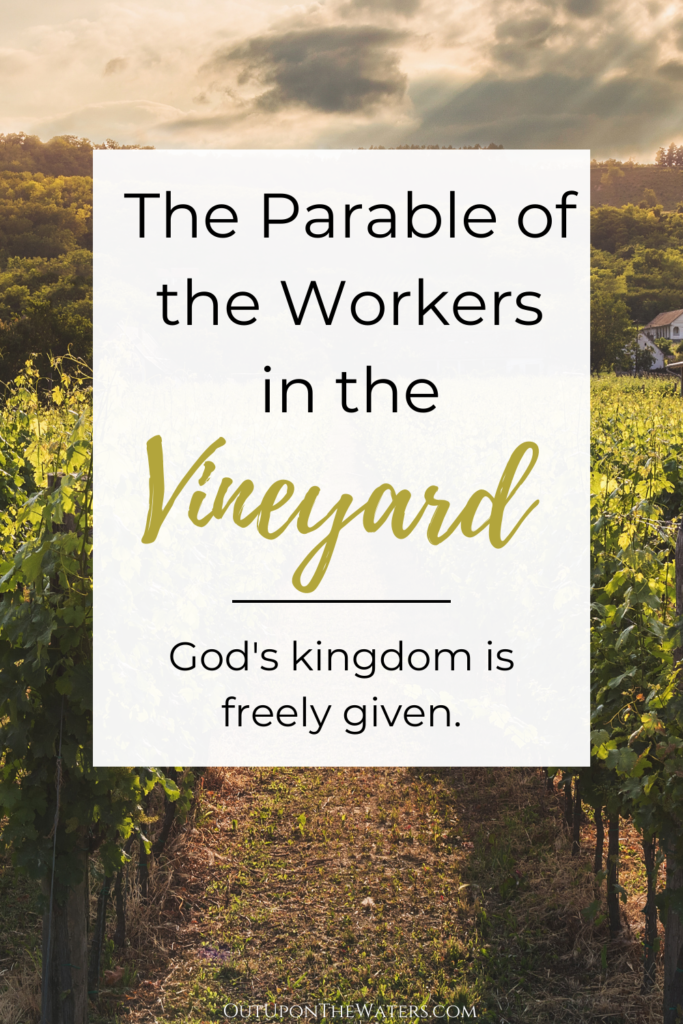
The Parable of the Workers in the Vineyard
In Matthew 20:1-16, Jesus tells the parable of the workers in the vineyard. The kingdom of heaven (kingdom of God) is like a landowner, he says, who went out early in the morning to hire workers for his vineyard. Some he hires at nine in the morning, some at noon, and come at five o’clock, near the very end of the workday. All of the workers, however, he pays the same.
When the workers who were hired earlier in the day complain that this is unfair, the landowner replies that each receive what they agreed to work for. He insists that he has the right to do what he wants with his money, and that he wanted to pay the workers who joined later the same as those who joined earlier. He questions whether the workers are envious because of his generosity.
This parable tells us that all are welcome into the kingdom of God, and that all receive the same reward, regardless of when they “join”. While this might seem unfair to those who have lived their whole lives trying to love their neighbor – that those who lived selfish lives and who turn to God only later in life should receive the same reward – Jesus tells us that God is generous and wants to redeem and restore all those who turn to him, no matter when they do so.
We learn from this parable that God is generous, and that we do not earn the kingdom of heaven; it is a free gift given to us.
3 More Parables about the Kingdom of God
While Jesus’ doesn’t explicitly say that these parable are about the kingdom of God, there are three more parables that Jesus tells that give us insight into the kingdom of God: the parable of the prodigal son, the parable of the lost coin, and the parable of the lost sheep (Luke 15).
Each of these parables tells about something that was lost that is now found. The parable of the prodigal son describes a man who rejoices when his son (who left home and squandered his inheritance) returns home. The parable of the lost coin tells of a woman who searches her house diligently for a lost coin and rejoices when she finds it. The parable of the lost sheep tells of a shepherd who leaves ninety-nine of his sheep in order to go and search for one that is lost.
These parables tell us that God will search for us when we wander or feel lost, and that he will rejoice when he brings us home. The prodigal son suggests that even those who leave home (those who lose faith) will return, and that God will not hold a “squandered inheritance” against anyone.
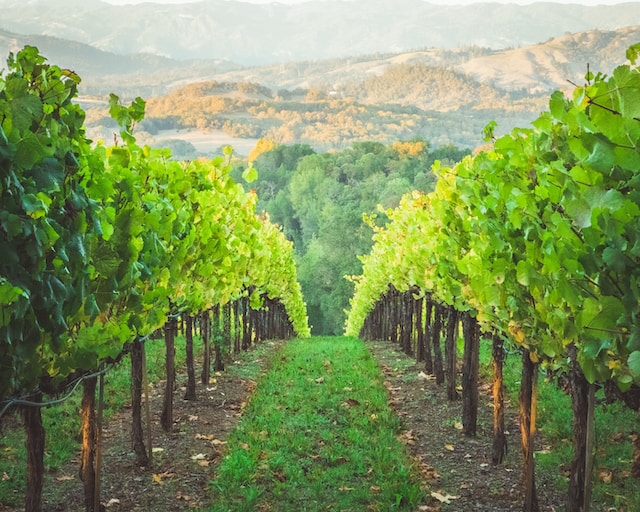
Thank you for your powerful insights into the kingdom of God! Very very helpful!
Charlie
I’m very glad that you found this helpful Charlie!
This study was quite helpful at a time when I needed to learn more about parables on the Kingdom of God.
May God bless you
I’m so glad you found it helpful, Sarah.
The parable of a pearl is massive.